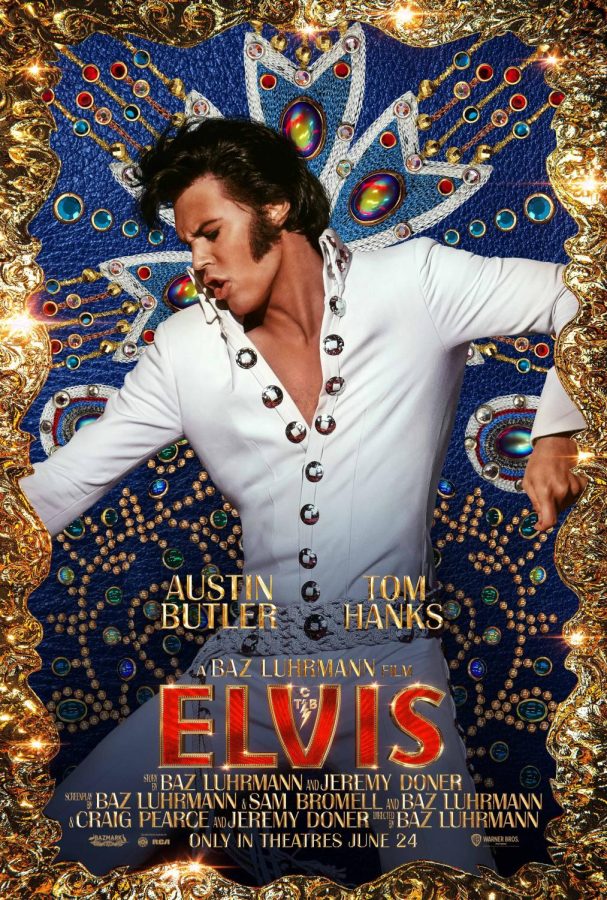Austin Butler shines as he brings The King of Rock ’n’ Roll to big screen in ‘Elvis’
June 15, 2022
“Elvis” follows rock ’n’ roll superstar Elvis Presley (Austin Butler) as he rises to stardom. The film showcases how the star is financially taken advantage of throughout his entire career by his slimy manager Colonel Tom Parker (Tom Hanks), who struggles to pay off his debts to a casino. In Presley’s struggles and booming success, he turns to drugs, eventually leading him to lose his wife and eventually his own life. Ultimately, “Elvis” makes for a tragic movie filled with triumph, heartbreak and, of course, excellent music.
While most biopics about musical artists seldom explore the musician’s impact on popular culture, “Elvis” does the complete opposite. The film explores Presley’s effect on American culture at the time, such as people fearing the loss of morality due to his provocative dance moves or the way he ignored segregation laws. “Elvis” even touches on parts of Presley’s career such as his manager’s greed and the origins behind his music, which ends up giving audiences a more personal look into the life of the rock star. Ultimately, this combination of topics makes “Elvis” not only a movie about The King of Rock ’n’ Roll but also an indictment of the problems in America from the 1950s to Presley’s death in the late 1970s.
Butler not only portrays but becomes Elvis Presley. Rather than it feeling like Butler is an actor playing this part, it felt like this film showcased a reincarnation of the late musician. Butler’s acting choices and mannerisms mimic Presley’s personality to a tee. Butler holds on to the childlike sense of wonder that Presley held for blues music while also taking on a growing sense of independence to show how Presley was learning about the realities of the music industry by being mistreated by the one person he trusted — the Colonel. Butler’s singing and speech sounded exactly like the rock star in a way that melded perfectly with Presley’s real recordings. Butler proves himself to be a true dramatic performer in his scenes of anger and sadness. Audiences feel every emotion coming from the actor, whether it be from the tone of his voice or the shake of his hips.
Visually, this movie feels like a dream, embracing colorful lights, beautiful set pieces and crazy spinning camera movements resemblant of Presley’s electric, rhythmic dance moves. Less exciting moments end up creating more emotion and tension because they often come after the large, vibrant set pieces like the Presley mansion or a television show stage.
The film also includes interesting music choices. Though the soundtrack features plenty of blues songs and Elvis songs, the movie’s score contains songs from around 24 other artists like Stevie Nicks and Doja Cat. The modern music in an old setting works really well despite public skepticism of the soundtrack in response to its original announcement. Doja Cat’s song, “Vegas,” actually stands out as one of the stronger tracks played throughout the entire movie.
“Elvis” triumphs as a story about both the life of Elvis Presley and his impact on the wider culture of America at the time. The film showcases the stories of those helping Presley rise to fame as well as those who abused his talent for financial gain. These elements combine to make a time capsule of American pop culture from the 1950s through the late 1970s. Audiences can expect to delight in this movie’s storytelling while also feeling grief for the tragic events of American history showcased throughout the tragic life of Elvis Presley.
4 ½ pelvises out of 5
















